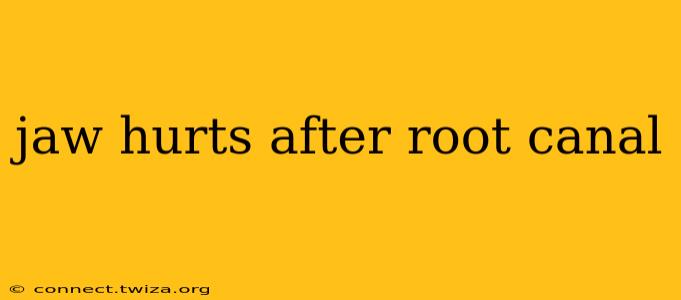A root canal, while designed to alleviate tooth pain, can sometimes leave you with jaw discomfort afterward. This isn't necessarily a cause for alarm, as some jaw soreness is a normal part of the recovery process. However, understanding the potential causes and knowing when to seek professional help is crucial for a speedy and comfortable recovery. This comprehensive guide will address common concerns and help you manage post-root canal jaw pain effectively.
Why Does My Jaw Hurt After a Root Canal?
Several factors can contribute to jaw pain following a root canal. The procedure itself involves manipulating tissues and potentially causing inflammation in the surrounding areas. Here's a breakdown of the possible culprits:
-
Inflammation: The root canal process can cause inflammation in the jaw muscles and tissues. This inflammation is a natural response to the procedure and typically subsides within a few days.
-
Trauma during the procedure: While rare, accidental trauma to the jaw during the root canal procedure can occur. This could lead to localized pain and discomfort.
-
Referred pain: Pain originating from the tooth may be perceived as jaw pain. Nerve pathways can sometimes transmit pain signals to areas distant from the source.
-
Pre-existing conditions: Individuals already experiencing temporomandibular joint (TMJ) disorder or other jaw conditions might find their pain exacerbated after a root canal due to the added stress.
-
Improper bite: If your bite is slightly off after the procedure (due to a temporary crown or filling), it can strain your jaw muscles and lead to pain.
-
Medication side effects: Some medications used during or after the root canal procedure could cause jaw muscle stiffness or discomfort as a side effect.
How Long Does Jaw Pain After a Root Canal Last?
The duration of jaw pain varies significantly from person to person. Mild discomfort usually resolves within a few days, while more intense pain might persist for a week or two. If the pain lasts longer than two weeks, or worsens considerably, it is essential to consult your dentist immediately.
Is Jaw Pain After a Root Canal Normal?
Some degree of jaw soreness is considered normal in the immediate aftermath of a root canal. This is usually mild and subsides relatively quickly with rest and over-the-counter pain relievers. However, intense, persistent, or worsening jaw pain is not normal and warrants a call to your dentist.
What Can I Do to Relieve Jaw Pain After a Root Canal?
Managing post-root canal jaw pain often involves a combination of self-care measures and professional advice:
-
Over-the-counter pain relievers: Ibuprofen or acetaminophen can help manage mild to moderate pain. Always follow the recommended dosage.
-
Ice packs: Applying ice packs to the affected area for 15-20 minutes at a time, several times a day, can reduce inflammation and numb the pain.
-
Rest: Avoid strenuous activities that could strain your jaw muscles. This includes chewing hard foods, excessive talking, and yawning widely.
-
Soft food diet: Stick to a soft food diet for the first few days after your procedure to minimize jaw movement.
-
Gentle jaw exercises: Your dentist might suggest gentle range-of-motion exercises to promote healing and reduce stiffness. Avoid any exercises that cause increased pain.
-
Professional dental care: This is crucial if pain is severe, persistent, or worsens over time. Your dentist can assess the situation, rule out complications, and provide appropriate treatment.
When Should I See a Dentist About Jaw Pain After a Root Canal?
Contact your dentist immediately if you experience:
- Severe or persistent jaw pain: Pain that doesn't respond to over-the-counter pain relievers or persists for more than a week or two.
- Swelling or redness in the jaw area: This could indicate an infection.
- Difficulty opening or closing your mouth: This could suggest a problem with your TMJ.
- Fever: A fever accompanies infection.
- Numbness or tingling in your jaw: This could indicate nerve damage.
By understanding the potential causes and knowing when to seek professional help, you can effectively manage jaw pain after a root canal and ensure a smooth recovery. Remember that open communication with your dentist is crucial throughout the entire process.
